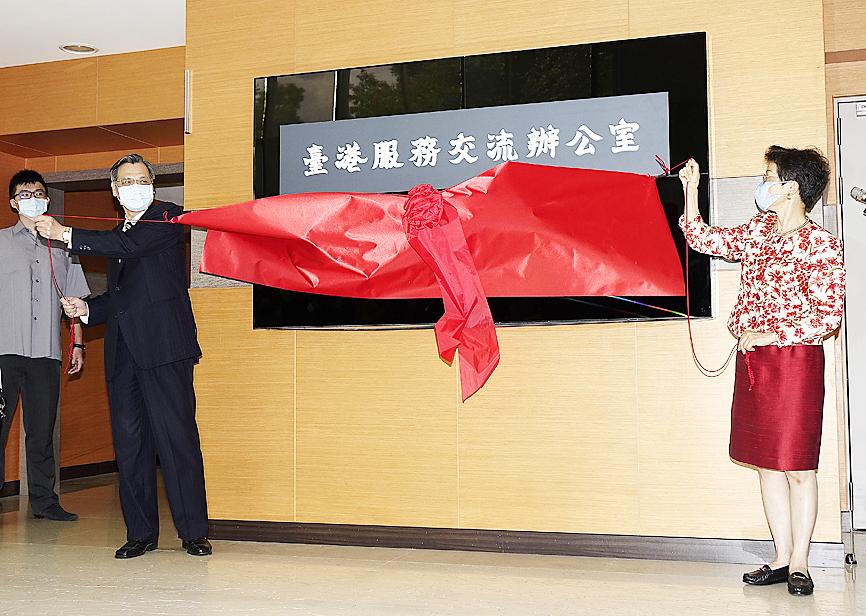The Taiwan-Hong Kong Services and Exchanges Office yesterday officially began operations, marking a milestone in the government’s support for Hong Kongers in their pursuit for democracy and freedom, Mainland Affairs Council (MAC) Minister Chen Ming-tong (陳明通) said.
Chen and Katherine Chang (張小月), chairwoman of the Taiwan-Hong Kong Economic and Cultural Cooperation Council, which oversees the office, yesterday unveiled the new unit’s plaque at a ceremony in Taipei.
The office is tasked with helping Hong Kongers who plan to study, work, invest, start a business or settle in Taiwan.

Photo: Chen Chih-chu, Taipei Times
It would also aid Hong Kongers whose security and freedom are at risk due to political factors on a case-by-case basis, as stipulated in Article 18 of the Act Governing Relations with Hong Kong and Macau (香港澳門關係條例).
Tu Chia-fang (杜嘉芬), a former director of the council’s Department of Hong Kong, Macao, Inner Mongolia and Tibet Affairs, is the new office’s director, while Yu Pi-ru (游璧如), a former senior specialist at the department, is the deputy director.
The office has a staff of 20 and is equipped with 20 telephone lines that offer services in Cantonese. The lines were mostly busy yesterday.
The office’s name plaque uses a font often seen on Hong Kong’s shop signs, showing the government’s expectation of fostering positive interactions with Hong Kongers, Chen said during the ceremony.
Asked about the national security legislation that China imposed on the territory on Tuesday, Chen said that Article 38 would not just affect Hong Kongers, but people worldwide, including Taiwanese.
The legislation would apply to people without permanent residency in Hong Kong if they are found to have committed crimes defined in the act outside Hong Kong, the article states.
Article 29 of the legislation states that people who encourage Hong Kong residents’ hatred for the central government or the Hong Kong government would face a series of outcomes, including prison terms ranging from three years to life, Chen said.
An American might be punished under the legislation if they are found to have criticized Beijing in the US and thus encouraged Hong Kongers’ hatred for Beijing, he said, adding that the act of a crime being committed would be established only if a Hong Konger testified to it.
The legislation is China’s injunction to the whole world, Chen said, urging all countries to pay serious attention to it.
Asked whether the MAC would suspend the Act Governing Relations with Hong Kong and Macau using Article 60 — which stipulates that the Executive Yuan could ask for the president’s approval to suspend the act if the situations in Hong Kong and Macau change and the act’s implementation might endanger Taiwan — Chen said that Taiwan would closely monitor the territory and respond at the proper time.

Right-wing political scientist Laura Fernandez on Sunday won Costa Rica’s presidential election by a landslide, after promising to crack down on rising violence linked to the cocaine trade. Fernandez’s nearest rival, economist Alvaro Ramos, conceded defeat as results showed the ruling party far exceeding the threshold of 40 percent needed to avoid a runoff. With 94 percent of polling stations counted, the political heir of outgoing Costa Rican President Rodrigo Chaves had captured 48.3 percent of the vote compared with Ramos’ 33.4 percent, the Supreme Electoral Tribunal said. As soon as the first results were announced, members of Fernandez’s Sovereign People’s Party

MORE RESPONSIBILITY: Draftees would be expected to fight alongside professional soldiers, likely requiring the transformation of some training brigades into combat units The armed forces are to start incorporating new conscripts into combined arms brigades this year to enhance combat readiness, the Executive Yuan’s latest policy report said. The new policy would affect Taiwanese men entering the military for their compulsory service, which was extended to one year under reforms by then-president Tsai Ing-wen (蔡英文) in 2022. The conscripts would be trained to operate machine guns, uncrewed aerial vehicles, anti-tank guided missile launchers and Stinger air defense systems, the report said, adding that the basic training would be lengthened to eight weeks. After basic training, conscripts would be sorted into infantry battalions that would take

GROWING AMBITIONS: The scale and tempo of the operations show that the Strait has become the core theater for China to expand its security interests, the report said Chinese military aircraft incursions around Taiwan have surged nearly 15-fold over the past five years, according to a report released yesterday by the Democratic Progressive Party’s (DPP) Department of China Affairs. Sorties in the Taiwan Strait were previously irregular, totaling 380 in 2020, but have since evolved into routine operations, the report showed. “This demonstrates that the Taiwan Strait has become both the starting point and testing ground for Beijing’s expansionist ambitions,” it said. Driven by military expansionism, China is systematically pursuing actions aimed at altering the regional “status quo,” the department said, adding that Taiwan represents the most critical link in China’s

‘REALLY PROUD’: Nvidia would not be possible without Taiwan, Huang said, adding that TSMC would be increasing its capacity by 100 percent Nvidia Corp CEO Jensen Huang (黃仁勳) on Saturday praised and lightly cajoled his major Taiwanese suppliers to produce more to help power strong demand for artificial intelligence (AI), capping a visit to the country of his birth, where he has been mobbed by adoring fans at every step. Speaking at an impromptu press conference in the rain outside a Taipei restaurant, where he had hosted suppliers for a “trillion-dollar dinner,” named after the market capitalization of those firms attending, Huang said this would be another good year for business. “TSMC needs to work very hard this year because I need a lot